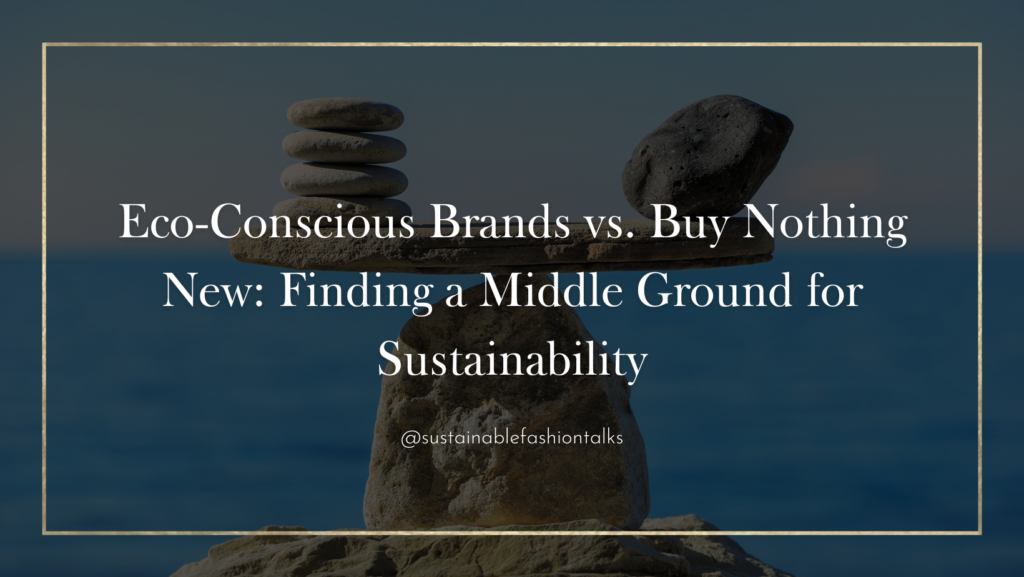In our journey towards sustainability, the “Buy Nothing New” campaign pushed by various environmental organizations has gained massive traction. Its aim is to reduce overconsumption, especially that fueled by fast fashion, and to encourage a more mindful approach to consumption. However, as an eco-educator deeply invested in promoting sustainable practices, I can’t help but question if this well-intentioned campaign might inadvertently be harming the very eco-conscious brands striving to make a positive impact.
The Dilemma of Extremes
On one side, fast fashion aggressively showcases the newest trends, convincing consumers that they need to constantly update their wardrobes. On the other side, we, as eco-educators, are urging people not to buy anything new at all. While our intention is to reduce waste and support environmental sustainability, I have seen this extreme stance sideline the very conscious brands that need our support to survive and thrive.
My Personal Journey in ‘Buy Nothing New’
Having participated in ‘Buy Nothing New’ campaigns myself, I have actively encouraged my followers to adopt this lifestyle shift. My goal has always been to promote less consumption and more mindfulness. However, I now find myself at a crossroads, questioning whether this stance might be counterproductive, especially when it comes to supporting sustainable fashion brands that rely on customer purchases for their survival.
Missed Opportunities for Advocacy
Throughout my engagement on various eco-education platforms, I’ve observed a recurrent theme: we’re spending too much energy criticizing the wrongdoers and not enough time amplifying the voices of those who are trying to do right. Conscious brands, small-scale artisans, and ethical producers are often overshadowed in the narrative dominated by the faults of large, unethical corporations. This imbalance can discourage eco-conscious brands from marketing themselves for fear of being perceived as overly commercial, despite their genuine sustainability efforts.
Ethical brand founders are afraid of being criticised for marketing
During my Sustainable Fashion Talks episodes, I always learn something new from these industry leaders. I have had a reoccurring conversation where almost each one of them has shared their fear of being criticized for marketing their products. In an industry where visibility equates to survival, how do we help direct consumers towards these deserving alternatives when we spend so much time focusing on the negatives of unethical brands?
The Paradox of Publicity
The irony is absurd. Eco-education platforms intended to raise awareness about sustainability end up giving significant publicity to fast fashion brands. This backfire effect means that even a critical mention results in heightened visibility. For instance, my familiarity with brands like Shein or Temu comes not from following them directly, but from seeing them repeatedly featured in discussions on eco-conscious platforms.
The Need for Balance
As sustainability advocates, our role should involve both critique and support. I absolutely agree that highlighting the malpractices of unethical brands is important, but equally important is promoting and celebrating the efforts of eco-conscious brands. Here’s a balanced approach I have decided to use and that I personally think can help us achieve this:
At Sustainable Fashion Talks, we
Recognize Small Changes: Small steps towards sustainability should be acknowledged as they can lead to big shifts in the industry. Personal experience has taught me that celebrating every effort, no matter how small, can encourage continued progress. There is an article about this on Fast Fashion’s Role in Sustainability: Helping or Corporate Hijacking?
Demand Transparency: We encourage all brands, including fast fashion, to be transparent about their sustainability claims. We see that regular, detailed reports and third-party audits can ensure these initiatives are truly meaningful.
Support Systemic Changes: We are collaborating with brands and policymakers to advocate for fundamental changes in the fashion industry. This includes promoting quality over quantity and ensuring longer product life cycles.
Collaborative Solutions: We have and will continue to engage in constructive dialogues with brands to explore more impactful sustainability strategies. Partnership in educational campaigns can raise awareness among consumers and employees alike.
The ‘Buy Nothing New’ campaign has its merits, but it is important to balance our messages. By supporting eco-conscious brands and offering positive reinforcement alongside necessary criticism, we can build a more sustainable and fair industry and keep “The ones trying to do better” in business.
As someone who has shifted from promoting fast fashion to advocating for conscious consumption, I know the power of positive change. At Sustainable Fashion Talks, we try to ensure that our collective efforts are inclusive and supportive of those trying to make a difference.
Navigating My Inner Conflict
Now, I find myself conflicted. On one hand, I believe in the principles of buying less and reusing more. On the other hand, I recognize the need to support sustainable brands that offer alternatives to fast fashion. My question to fellow eco-educators and advocates is this: How can we find a balance? How can we direct consumer attention towards ethical brands without compromising our core message against excessive consumption? I invite you to share your thoughts. Your insights and experiences are needed in this conversation.
Note: This article is not perfectly written because it’s written by me and not ChatGPT 🙂
